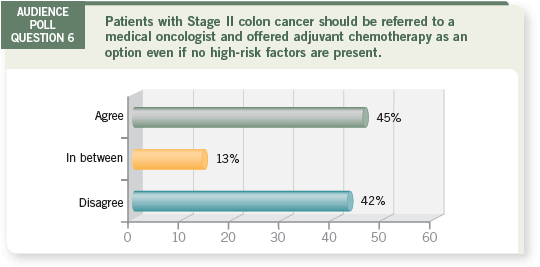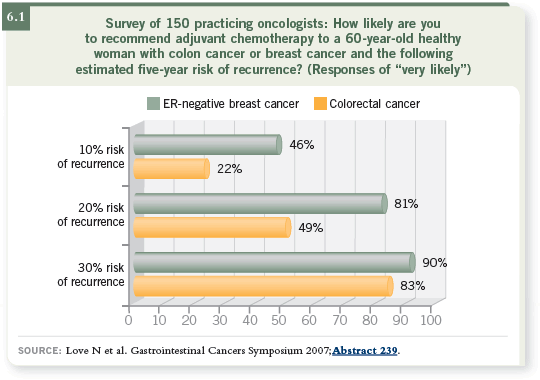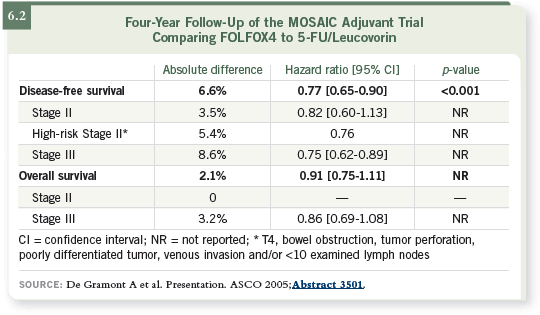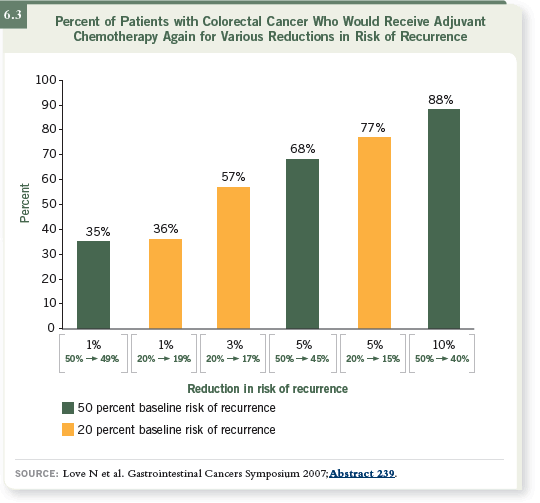
| Tracks 1-6 |
| Track 1 |
Adjuvant chemotherapy for patients with Stage II colon cancer |
| Track 2 |
Differences in physician perceptions of benefit from adjuvant therapy in breast and colon cancer |
| Track 3 |
Patients’ perceptions of potential benefit from adjuvant therapy |
|
| Track 4 |
Patients’ expectations regarding toxicity and side effects of chemotherapy |
| Track 5 |
Risk-benefit considerations and impact on patient preferences for adjuvant chemotherapy |
| Track 6 |
Survey of patients’ and physicians’ perspectives on preferences for adjuvant therapy |
|
|

Track 1
 DR LOVE:
DR LOVE: Neal, what do we know about the impact of adjuvant chemotherapy
on patients with Stage II colon cancer?
 DR MEROPOL: The management of Stage II colon cancer is a difficult
decision-making scenario, insofar as the prognosis is good with surgery alone
and the potential benefit of adjuvant therapy for the population as a whole is
marginal. If you were to treat all patients who have Stage II colon cancer with
adjuvant therapy, the absolute benefit would probably be in the range of five
percent or less for the most active chemotherapy regimen (Andre 2004; de
Gramont 2005).
DR MEROPOL: The management of Stage II colon cancer is a difficult
decision-making scenario, insofar as the prognosis is good with surgery alone
and the potential benefit of adjuvant therapy for the population as a whole is
marginal. If you were to treat all patients who have Stage II colon cancer with
adjuvant therapy, the absolute benefit would probably be in the range of five
percent or less for the most active chemotherapy regimen (Andre 2004; de
Gramont 2005).
The challenges are in defining which patients are at the greatest risk of relapse
from the group of patients with Stage II disease and in selecting those patients
for adjuvant therapy because their potential for benefit is greater.
Patients have different values with regard to the tradeoffs of the potential
benefits and side effects. This requires a discussion about the option of
adjuvant therapy — the potential hazards, which are well defined, and the
potential benefits, which are less well defined for any individual.
The doctor and patient have to come to an agreement and understanding
about what is best for that individual patient. With regard to your question
about whether all patients with Stage II colon cancer should be referred to a
medical oncologist, my answer is that all of those patients should engage in a
discussion about adjuvant therapy and whether it’s right for them.

Track 2
 DR LOVE:
DR LOVE: When we ask oncologists nationally, “What are you likely to
recommend to a woman who has a 10 or 20 percent risk of relapse from
breast cancer?” the vast majority say they’re likely to recommend chemotherapy,
but in colon cancer, far fewer docs say they would treat a patient
with colon cancer and the same risk for relapse (6.1). What do you think
explains these differences?
 DR MEROPOL: I believe part of it is cultural and part of it is data driven. With
regard to the data in breast cancer, prospective randomized studies involving
thousands of patients have conclusively shown and defined the small benefit from
the addition of adjuvant therapy for an individual who’s at low risk of relapse.
DR MEROPOL: I believe part of it is cultural and part of it is data driven. With
regard to the data in breast cancer, prospective randomized studies involving
thousands of patients have conclusively shown and defined the small benefit from
the addition of adjuvant therapy for an individual who’s at low risk of relapse.
In colon cancer, we don’t have those kinds of data. We have extrapolations
from a higher-risk situation and pooled analyses that either show no benefit or
marginal benefit (Benson 2004; Figueredo 2004; Gill 2004).
The most compelling data with regard to patients with Stage II colon cancer
are from the MOSAIC trial, in which patients with Stage II disease seem to
have a benefit of a few percent in three- and four-year disease-free survival
with FOLFOX over 5-FU/leucovorin (Andre 2004; de Gramont 2005; [6.2]).
The overall survival data have not been reported yet. So we don’t have the
long-term follow-up, but we do know there’s an attendant risk of long-term
neurotoxicity, which affects decisions about the use of this therapy when the
gain is marginal in terms of overall survival.

Track 6
 DR LOVE:
DR LOVE: We asked 150 people who had received adjuvant chemotherapy
for colorectal cancer in the last five years, “How much benefit would you
want to receive in order to go through chemotherapy again?” Approximately
one third of them would go through chemotherapy again for a one
percent reduction in relapse rate, and more than half of them would go
through therapy for a three percent reduction (6.3).

 DR WOLMARK: I believe that from a biologic standpoint, we have no reason to
think that Stage II patients are a unique subset relative to their responsiveness
to adjuvant therapy. It’s just that they’re at lower risk for recurrence.
DR WOLMARK: I believe that from a biologic standpoint, we have no reason to
think that Stage II patients are a unique subset relative to their responsiveness
to adjuvant therapy. It’s just that they’re at lower risk for recurrence.
What your analysis, Neil, has shown is very useful. The heterogeneity
between breast and colon cancer does not lie in the tumor or in the patient.
Patients want to be treated for the same low risk, whether they have breast or
colon cancer. The heterogeneity lies in the fact that, traditionally, the medical
oncologist who specializes in colorectal cancer is less enthusiastic about
adjuvant therapy.
The irksome part from my perspective is not that all Stage II patients should
be treated — it’s that all Stage II patients should be apprised of the benefit of
adjuvant chemotherapy.
I believe what we need to resolve this issue is a tool that allows us to evaluate
patients beyond the traditional factors we’ve used to decide which patients with
early-stage colorectal cancer to treat. We need an assay equivalent to Oncotype DX™, and I believe we’re making significant progress relative to that.
 DR HOCHSTER: I agree that every patient with Stage II cancer would benefit
from seeing a medical oncologist. Even if they decide against adjuvant therapy,
they reap other benefits, such as discussions about the risk of colorectal cancer
for relatives and how they can be screened. Patients also need to know how
their health-related issues for the next 25 years will be different as a result of
their having colorectal cancer, particularly in terms of future screening so that
if they’re the one patient in five who develops recurrence, we can capture it
when it’s likely to be curative.
DR HOCHSTER: I agree that every patient with Stage II cancer would benefit
from seeing a medical oncologist. Even if they decide against adjuvant therapy,
they reap other benefits, such as discussions about the risk of colorectal cancer
for relatives and how they can be screened. Patients also need to know how
their health-related issues for the next 25 years will be different as a result of
their having colorectal cancer, particularly in terms of future screening so that
if they’re the one patient in five who develops recurrence, we can capture it
when it’s likely to be curative.
Select Publications

